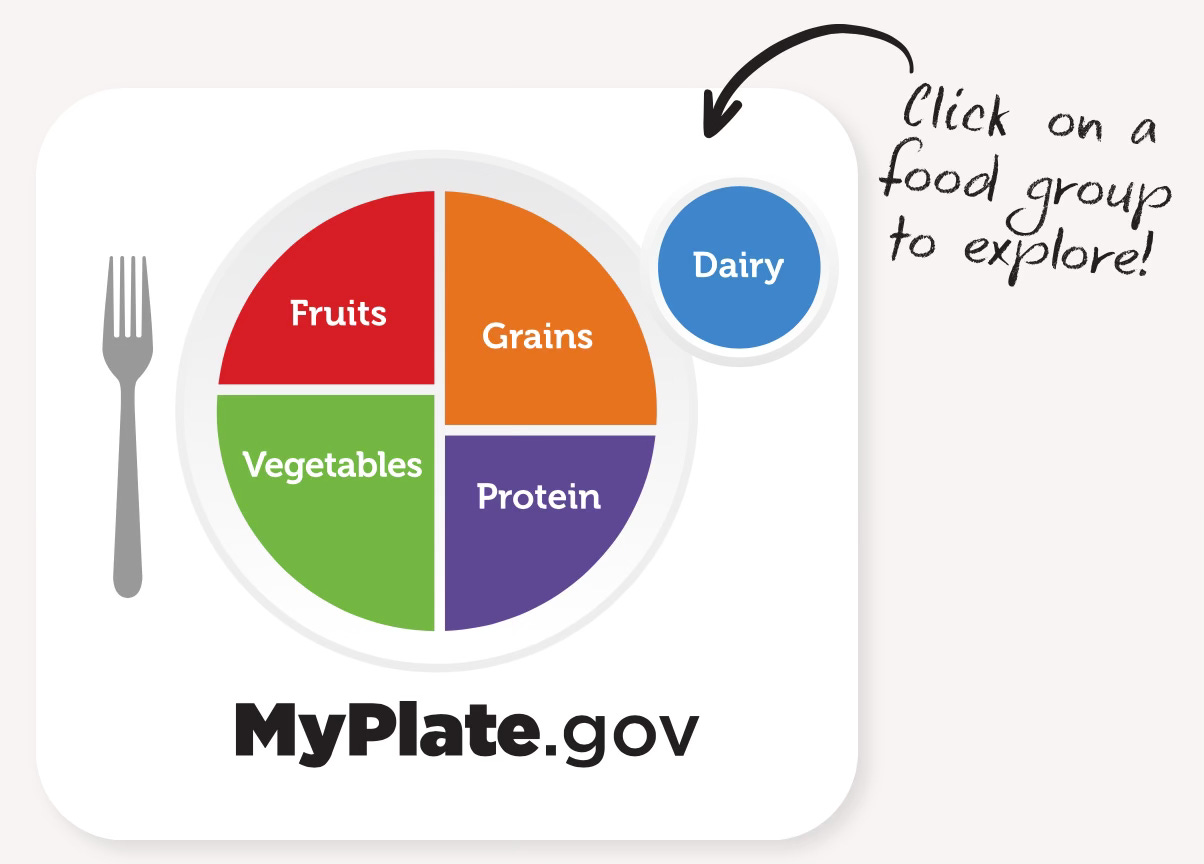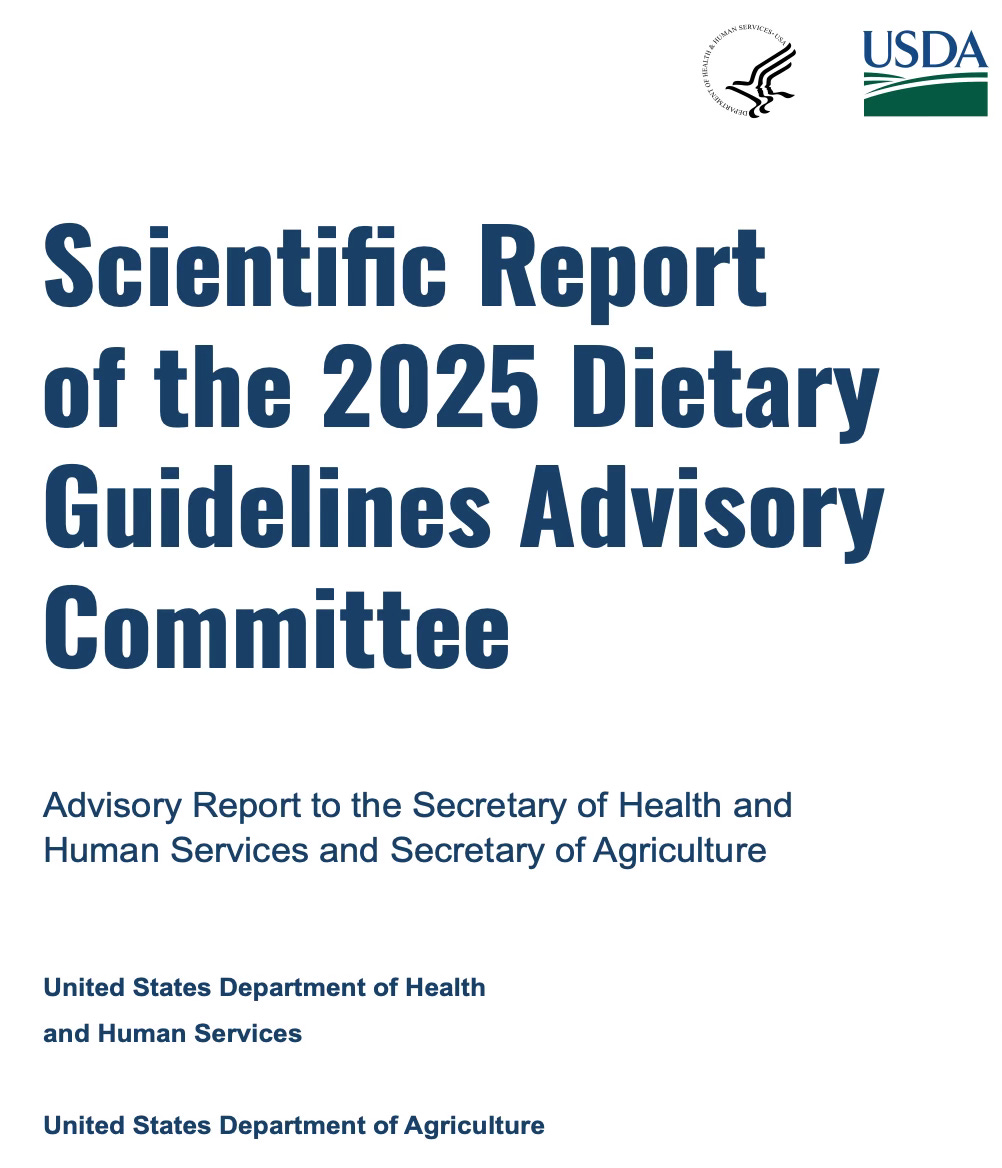Eric Berg is a YouTube personality and is among a long list of folks who have been vocal in supporting RFK in the nutrition space. The MAHA commission truly is a clown car of wellness grifters and antiscientific hacks. But let’s not get too off track in the first two sentences of this post. I came across this “news” article, and it got me wondering about the kind of brain power that is driving and supporting this MAHA movement. Chiropractor Eric Berg says the “first thing we need to do is get rid of the food pyramid because it is 60% carbohydrates and is akin to a feedlot system, which is great for making cattle fat”. This guy is a joke, and from this opening shot across the bow, it is clear he has no idea what is being advised at a national level.
Watch the first 20 seconds and understand how unserious this person is for this role.
The food pyramid is no longer used as a visual for guidance on nutrition. It was replaced by MyPlate in 2011, making 2011 the last year the Food Pyramid was actively used as the USDA's primary nutrition guidance tool. The Food Pyramid (updated to MyPyramid in 2005) was officially phased out when the USDA introduced MyPlate on June 2, 2011. This change was part of the Obama administration's efforts to simplify nutritional guidance and combat obesity. MyPlate uses a plate icon divided into four sections (fruits, vegetables, grains, and protein) with a smaller circle for dairy to visually represent balanced meal proportions.
How should we tackle this? Let’s start with Eric Berg, who is he and why does the MAHA commission think he is the expert to lead the US forward on a nutrition drive health revolution?
Background & Credentials
Eric Berg is a chiropractor who graduated from Palmer College of Chiropractic in 1988. He is not a medical doctor (MD) or registered dietitian (RD).
Current Business/Practice
Berg operates a wellness consulting business primarily through social media platforms and his website, "Dr. Berg's Health and Wellness Center." He has a significant online presence with millions of followers on YouTube, where he provides health advice and sells supplements.
Important Note on Qualifications
While Berg uses the title "Dr.," it's important to note this refers to his Doctor of Chiropractic (DC) degree, not a medical doctorate. He is not licensed to practice medicine. Qualifications aren’t always the most important thing to lean on, and I try not to make this an appeal to authority. If someone is a chiropractor and wants to provide qualified opinions to guide public policy, they would surely need education in public health, nutrition, preventive medicine, or behavior change. The other key component would be that they should have a demonstrated history of publishing research in the field so that they can be deemed an expert.
Peer-Reviewed Publications
After extensive searching, no peer-reviewed publications by Eric Berg could be found in major academic databases (PubMed, Google Scholar, Web of Science). For someone who is providing nutrition advice which could determine public health policy, this is a massive red flag. And no this is not a situation where you need someone from the outside to break the wheel and course correct. This is simply stupidity dressed up as innovation and disruption.
Professional History
Berg previously operated a chiropractic clinic in Alexandria, Virginia. His current focus is on creating online content about nutrition, weight loss, and health topics. He has a massive following on YouTube, where he posts videos on a range of topics with a unique style and uses a whiteboard in an educational style. Admittedly, the videos are typically engaging and can feel like you are sitting in a classroom learning from an expert.
Channel Overview
Dr. Berg's YouTube channel has over 9 million subscribers and features content primarily focused on health, nutrition, and wellness topics. The channel posts regular content emphasising keto diet, intermittent fasting, and general health education.
Analysis of Top 5 Videos
1. I (7.2M views, 298K likes)
Explains 16/8 fasting window - 16 hours fasting, 8 hours eating
Discusses how fasting affects insulin levels and fat burning
Outlines common mistakes when starting intermittent fasting
Details what breaks a fast (sweeteners, medications, supplements)
Provides tips for managing hunger during fasting periods
2. Apple Cider Vinegar Benefits (6.8M views, 275K likes)
Recommends 2-3 tablespoons daily diluted in water
Explains impact on blood sugar regulation
Discusses potential benefits for digestion
Outlines best timing for consumption
Warns about potential side effects and contraindications
3. Keto Diet Fundamentals (6.5M views, 262K likes)
Explains macro ratios: 70% fat, 25% protein, 5% carbs
Lists recommended foods and foods to avoid
Discusses common keto-adaptation symptoms
Explains the importance of electrolytes
Outlines meal timing and portion control
4. Vitamin D and Immune Health (6.1M views, 245K likes)
Discusses optimal vitamin D blood levels
Explains sunlight exposure recommendations
Details vitamin D's role in immune function
Covers factors affecting vitamin D absorption
Lists food sources of vitamin D
5. Belly Fat Solutions (5.9M views, 238K likes)
Discusses the role of cortisol in belly fat storage
Explains impact of insulin resistance
Outlines recommended dietary changes
Details exercise recommendations
Covers sleep and stress management strategies
Key Points from Fox News Article
An article was published on the Fox “News” website recently where he discusses his approach to nutrition. Here are some high level points and you should go ahead and watch the short video where he gives himself away as totally incompetent in the first 10 seconds.
Dr. Berg emphasizes the importance of making nutrition education a top priority in American healthcare
He advocates for better understanding of how different foods affect the body and metabolism
The article discusses the relationship between proper nutrition and overall health outcomes
Berg promotes awareness about the role of diet in preventing health issues
He suggests that nutritional knowledge should be more widely accessible to the public
Why am I highlighting this person as inept at providing advice on nutrition or giving commentary on public health recommendations for the US? He has no qualifications in nutrition research, public health, or behavior change. His videos, while entertaining, suffer from misinformation and bold claims (”when you don’t eat sugar, your stomach shrinks and therefore your appetite goes down”) and are not congruent with research methodology. When determining what dietary approaches are best for Americans to follow, we already have great guidelines to refer to. They already cover much of what the MAHA commission falsely claims is happening in science now. They are transparent in their methodology, are supported by evidence, and acknowledge where further research needs to be completed. You can read it all right here. It shows that Eric Berg has no idea what he is talking about. You can also listen to this great podcast episode with one of the guideline committee experts Dr Christopher Gardner here. In this episode, he discusses how the recommendations are made and how the report follows a rigorous scientific standard that is transparent.
While you are welcome to disagree with the guidelines, you can’t also say that the guidelines are harming people, when the vast majority don’t follow them.
If you want to have a conversation about why folks don’t follow the guidelines then that is a real conversation. Off the top of my head there are a number of more pertinent reasons that have nothing to do with the guidelines not recommended ketogenic or meat-only diets. Wage growth is poor, processed foods are cheap and well marketed, fruits, veggies and whole grains can be challenging for folks to store and prepare when they have limited time, skill and housing insecurity. A great article published in the Lancet recently highlights many of the key aspects of tackling the obesigenic environment. This is what we need, more funding and amplification of true scientists. Not grifters.
When it comes to public health recommendations for nutrition, please keep YouTube stars like Eric Berg out of the conversation. He will do nothing but enrich himself and create confusion.






Extra points for the illustration. 🏆